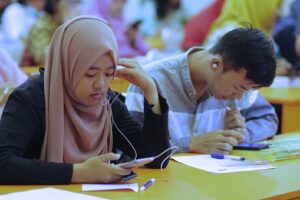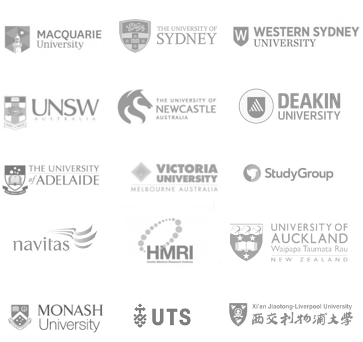
Monash Indonesia campus
Monash Indonesia is the next campus in the Monash University global network. Opening in 2021, we are now recruiting academic talent in the fields of business innovation, data science, public health innovation, public policy and urban design, as well as a dedicated team of enterprising professional staff. Contact my team for more on how to join. To learn more about how joining Monash Indonesia will put academics into an emerging tech ecosystem, with opportunities for applied research and education in all these fields and more, see below.
Indonesia’s economy
To understand the booming tech scene in Indonesia, it helps to first consider the wider economic context. Indonesia is the 7th largest country by GDP (PPP). It ranks after China, the USA, EU, India, Japan, Germany and Russia according to the IMF, World Bank and CIA. https://en.wikipedia.org/wiki/List_of_countries_by_GDP_(PPP)
Indonesia is the fifth country in the world by total population (close to 260 million). Indonesia has a young population, with 50 percent below the age of 27 years old, who welcome the thriving digital ecosystem, to which access remains affordable. Smartphone apps are key because in Indonesia, 96% of internet users access the internet via their handheld device (Hootsuite, Digital Indonesia, January 2020).
Home to more than 6,000 start-ups, boom areas driving the Indonesian economy are e-commerce and fintech, and new business verticals logistics, payments, digital health and EdTech. Traditional businesses and government are accelerating digitisation, further feeding the tech ecosystem.
Indonesia’s tech sector and start-ups
Indonesia is a growth hub for apps and tech start-ups, driven by its massive, tech-savvy population, growth of the digital economy and supportive government initiatives for IPOs. Indonesia’s Internet economy is forecast to grow to more than US$133 billion annually by 2025, according to consultancy A.T. Kearney.
Research by CBInsights found Jakarta leading the world’s emerging startup frontiers, followed by Dubai, Vienna, and Istanbul. Indonesia’s tech scene is centred in greater Jakarta with other key centres in Bali, Bandung, Surbaya and Yogyakarta.
The impact of Indonesia in the global start-up ecosystem is growing with over 4K tech start-ups, and the sector is still developing and maturing. Key innovation sectors are E-Commerce, HRtech and Fintech. Digital health has been positioned as one of the next key areas of start-up growth by the Indonesian Government since 2018, alongside ed-tech.
Indonesia has the most unicorns in Southeast Asia and a large group of emerging “Soonicorns”. Indonesia ranks 8th for the number of Unicorns, after the US, China, India, UK, South Korea, France and Israel. Notable unicorns include OVO (fintech), Tokopedia (online marketplace), Traveloka, Bukalapak and Gojek. Gojek is the largest by valuation, ranking 20th in the world. Gojek started as a bike taxi app in Jakarta and has since diversified into an on-demand multi-service platform and digital payment technology group and has expanded operations to several countries in Asia.
The Indonesian president, Joko Widodo is a strong advocate of digital innovation for the national good. Gojek co-founder Nadiem Makarim is the current Minister for Education and Culture. Mr Nadiem has spoken in recent public seminars about his vision for higher education as being interdisciplinary and engaged with industry.
The biggest limiter to the tech sector is a skills shortage which the Indonesian government plans to address through opening the start-up economy to global talent and through encouraging knowledge transfer through education.

Photo taken in Yogyakarta, Indonesia
Social media prevalence and the rise in education technology
While local EdTech players are largely focused on K-12 education, including Zenius.net, Quipper.com and Ruangguru.com many local university students will be familiar with learning management systems that have been adopted around the world, such as Moodle and Canvas LMS by Instructure.
While Indonesia’s internet penetration is 56 percent, below the Southeast Asia average of 63 percent (We Are Social, 2019), social media use grew 13 percent year-on-year in 2019 compared with 2018, adding 17.3 million new users, more than all but three other countries (We Are Social, 2019). Despite having these impressive numbers, the quality of connections—as measured by download speed—is poor (Figure 28). Also, unlike mobile broadband, fixed broadband penetration is low in Indonesia. However, Indonesia is a vast country with 17,508 officially listed islands, so there is a range of connectivity. Networks and uptake are much stronger on average in Java, and particularly, Jakarta.
We are now hiring global academic talent for Monash Indonesia. For more, check under Opportunities on our site here and visit the Monash University official microsite here: bit.ly/MonashI
Sources and further reading
Bhardwaj, R., and Yarrow, N. with Calì, M. 2020. EdTech in Indonesia: Ready for Take-off? Jakarta: World Bank Group https://openknowledge.worldbank.org/handle/10986/33762
https://www.austrade.gov.au/Australian/Export/Export-markets/Countries/Indonesia/Industries
https://techcrunch.com/tag/indonesia/
https://www.crunchbase.com/hub/jakarta-information-technology-companies
https://en.wikipedia.org/wiki/List_of_unicorn_startup_companies
https://www.reuters.com/article/us-indonesia-bill-workers-idUSKBN2081JF
https://gdpventure.com/good-news/rise-indonesias-tech-scene
https://datareportal.com/reports/digital-2020-indonesia
https://42matters.com/indonesia-app-market-statistics
https://www.cbinsights.com/research/report/emerging-startup-hubs/
https://blog.google/around-the-globe/google-asia/sea-internet-economy/


